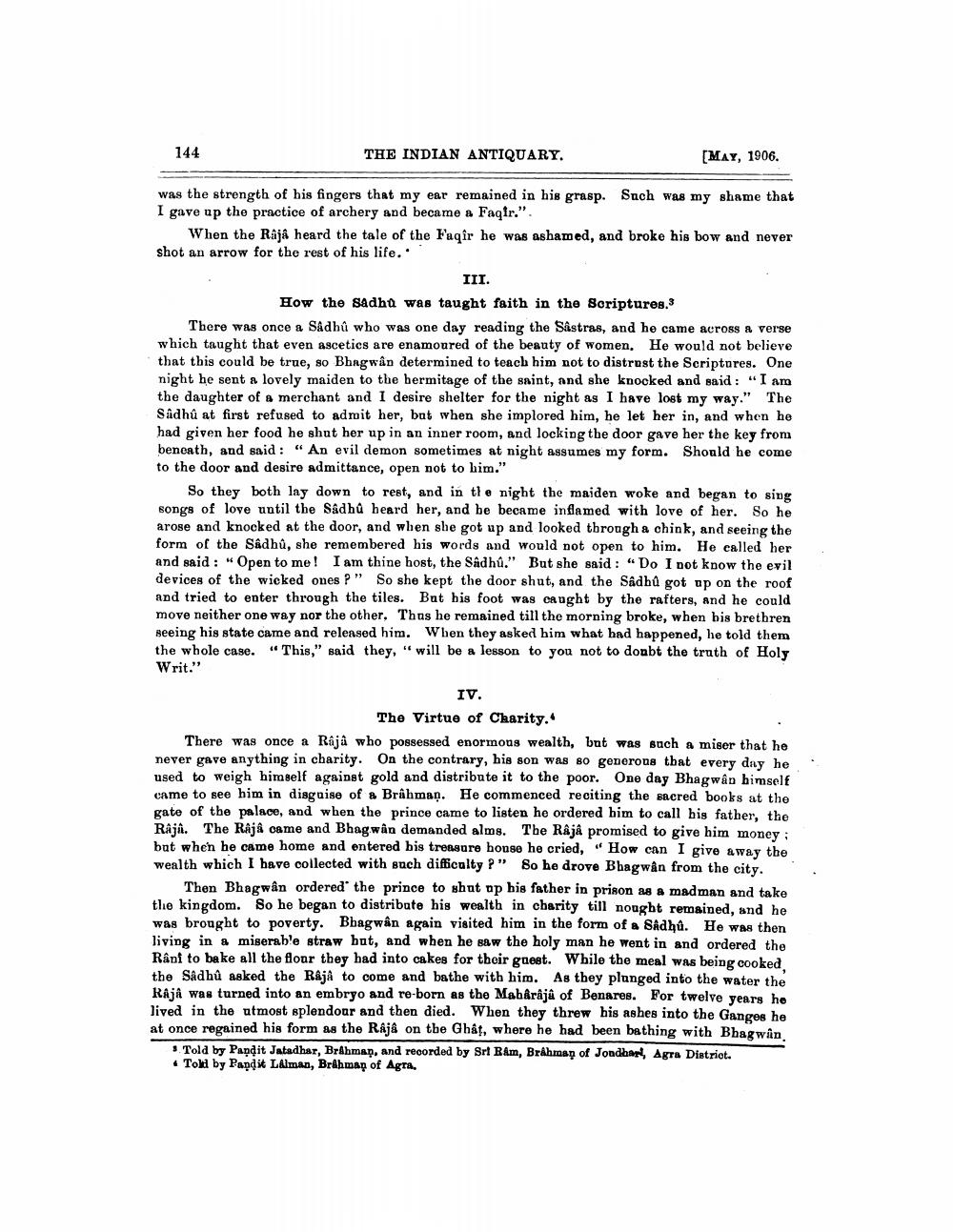________________
144
THE INDIAN ANTIQUARY.
[MAY, 1906.
was the strength of his fingers that my ear remained in his grasp. Such was my shame that I gave up the practice of archery and became a Faqir.".
When the Rajá heard the tale of the Faqir he was ashamed, and broke his bow and never shot an arrow for the rest of his life..
III. How the sadha was taught faith in the Scriptures.3 There was once a Sadhû who was one day reading the Sastras, and he came across a verse which taught that even asceties are enamoured of the beauty of women. He would not believe that this could be true, so Bhngwîn determined to teach him not to distrust the Scriptures. One night he sent a lovely maiden to the hermitage of the saint, and she knocked and said: "I am the daughter of a merchant and I desire shelter for the night as I have lost my way." The Sadhû at first refused to admit her, but when she implored him, he let her in, and when he had given her food he shut her up in an inner room, and locking the door gave her the key from bencath, and said: “An evil demon sometimes at night assumes my form. Should he come to the door and desire admittance, open not to him."
So they both lay down to rest, and in the night the maiden woke and began to sing songs of love until the Sådhú heard her, and be became inflamed with love of her. So he arose and knocked at the door, and when she got up and looked through a chink, and seeing the form of the Sâdhů, she remembered his words and would not open to him. He called her and said: "Open to me! I am thine host, the Sadhů." But she said: "Do I not know the evil devices of the wicked ones P" So she kept the door shut, and the Sadhu got up on the roof and tried to enter through the tiles. But his foot was caught by the rafters, and he could move neither one way nor the other. Thas he remained till the morning broke, when his brethren seeing his state came and released him. When they asked him what had happened, he told them the whole case. "This," said they," will be a lesson to you not to doubt the truth of Holy Writ."
IV.
The Virtue of Charity. There was once a Raja who possessed enormous wealth, but was such a miser that he never gave anything in charity. On the contrary, his son was so generous that every day he used to weigh himself against gold and distribute it to the poor. One day Bhagwân himself came to see him in disguise of a Brahman. He commenced reciting the sacred books at the gate of the palace, and when the prince came to listen he ordered him to call his father, the RAJA. The Rajâ came and Bhagwan demanded alms. The Râjâ promised to give him money : but when he came home and entered his treasure house he cried, “How can I give away the wealth which I have collected with such difficulty ?" So he drove Bhagwan from the city.
Then Bhagwan ordered the prince to shut up his father in prison as a madman and take the kingdom. So he began to distribute his wealth in charity till nought remained, and he was brought to poverty. Bhagwân again visited him in the form of a Sadhû. He was then living in a miserable straw hat, and when he saw the holy man he went in and ordered the Ráni to bake all the flour they had into cakes for their guest. While the meal was being cooked the Sådhů asked the RájA to come and bathe with him. As they plunged into the water the Raja was turned into an embryo and re-born as the Maharaja of Benares. For twelve years he lived in the utmost splendour and then died. When they threw his ashes into the Ganges he at once regained his form as the Raja on the Ghâţ, where he had been bathing with Bhagwan
5 Told by Pandit Jatadhar, Brahman, and recorded by Sri Ram, Brahmap of Jondhart, Agra District. • Tok by Pandit Lålman, Brahmap of Agra,
.




